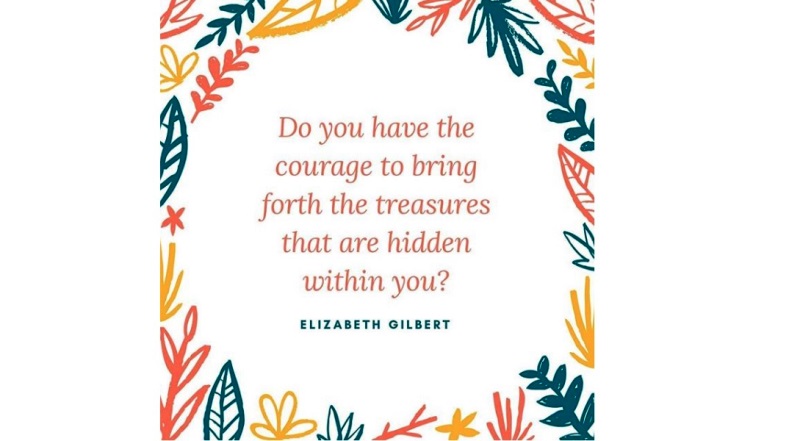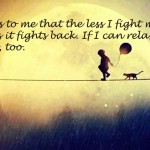“Let me begin by telling you the most magical thing that’s ever happened to me. It’s about a book that I failed to write.”
“Big Magic” (2015) by Elizabeth Gilbert is a handbook that every artist should revisit every often. It spoke to me softly, personally, and as though it has known my deepest, most intimate thoughts. “Big Magic” is interspersed with personal details of incidents that have transpired in Gilbert’s life and those of her acquaintances. It traces the origin or the applications of her theories, and reaffirms the title of her book.
In this post, I will attempt to discuss snippets of her book. The fragments will hardly cover the smallest percentage of the goldmine that her book embodies.
Suggested read: Creativity Does Not Have To Be A Suffering Contest
- “And we all know that when courage dies, creativity dies with it. We all know that fear is a desolate boneyard where our dreams go to desiccate in the hot sun. This is common knowledge; sometimes we just don’t know what to do about it.”
In the chapter, “Scary, Scary, Scary”, Gilbert enlists common fears which artists face. “You’re afraid somebody else already did it better.” “You’re afraid your dreams are embarrassing.” It feels like Gilbert is peering into your very own subconscious, pulling the demons up by their collars, and saying, “Hey, are you comfortable?” The insight also explains that you are not the only one with discouraging voices in your head. The greatest art has always needed the highest form of courage. For every appreciative comment, there will be a bag full of sneers, but our art should come to depend on neither.
- “As the saying goes: “Argue for your limitations and you get to keep them.” Why would I want to keep my limitations? I didn’t, as it turned out. I don’t want you keeping yours, either.”
When faced with hardship, we tend to resist the voices that say, “It will be alright”, “It will all fall into place”, “You are stronger than this”. So many times, I have caught myself mentally screaming at well-wishers saying, “You do not know what this pain feels like. You do not know if this will be okay. I don’t feel strong enough, and you should stop calling me a warrior.” As it turns out, we tend to defend our weaknesses, because it makes us feel comfortable; it gives us the easy way out of having to dust our sorrows off and face our fears.
- “I believe that our planet is inhabited not only by animals and plants and bacteria and viruses, but also by ideas…political. When an idea thinks it has found somebody—say, you—who might be able to bring it into the world, the idea will pay you a visit. It will try to get your attention…but when it finally realizes that you’re oblivious to its message, it will move on to someone else.”
This idea in “Big Magic” has helped change my view about creating art. When an idea dawns on me, I now treat it as a human being. I do not seen-zone their texts and then expect them to wait for me to come around. I do not mistreat them, or engage with them half-heartedly. When I am encumbered with work and simply do not have the time to entertain them, I sadly let them go, without making them wait, or putting them away with a month’s notice.
When inspiration strikes, act on it. Write that piece, paint that picture, compose that song. When the idea gets tired of waiting, it will move on with its potential, to somebody who is willing to give it their immediate attention. Gilbert illustrates this phenomenon with a surprising real-life incident, in the book.
- “People convince themselves that they have been robbed when they have not, in fact, been robbed. Such thinking comes from a wretched allegiance to the notion of scarcity—from the belief that the world is a place of dearth, and that there will never be enough of anything to go around. The motto of this mentality is: Somebody else got mine.”
There is enough space for artists to coexist without being at each other’s throats. We often find situations where we accuse somebody else of “stealing” our thoughts, when in fact, we forget that a line of thinking can be attributed to more than one person in a pool of seven billion heads. When Gilbert published, ‘Eat, Pray, Love’, a lot of people angrily accused her of stealing their manuscripts, their stories, their journey. She could never have known the stranger’s story, but that logic did not stop the resentment from running its toxic course. As artists, collaborators, and creative beings, we need to learn to respect the artistic labour of our fellow creators.
- “The idea of an external genius helps to keep the artist’s ego in check, distancing him somewhat from the burden of taking either full credit or full blame for the outcome of his work. If your work is successful, in other words, you are obliged to thank your external genius for the help, thus holding you back from total narcissism. And if your work fails, it’s not entirely your fault. You can say, ‘Hey, don’t look at me—my genius didn’t show up today!’”
Gilbert asks you to look at your potential as something the Greek and Romans called a daemon. It is an external being essentially linked to your existence. Your genius, your potential, your ability to create, will not always be in its best form. On some days it will be sick, on some others it might be on a vacation. Intermediate bumps will never mean that you have lost your creative potential or that you have suddenly unlearned your skillset. We tend to beat ourselves up over phenomenon that are way beyond our control.
- “The guardians of high culture will try to convince you that the arts belong only to a chosen few, but they are wrong and they are also annoying. We are all the chosen few. We are all makers by design. Even if you grew up watching cartoons in a sugar stupor from dawn to dusk, creativity still lurks within you. Your creativity is way older than you are, way older than any of us.”
Your art does not have to compliment or surpass highbrow standards in order for it to be legitimised. Each one of us here are trying to make the best we can out of what we have. It will be great for some, and will miss the mark for some others. But neither of that is what brings credibility to what we create. Our art is a legitimate being from the very moment we conceive it. Do not allow the false standards of others dictate your worth or ability. As Gilbert says, “You do not need a permission slip from the principal’s office to live a creative life.”
Suggested read: Can We Separate The Art From The Artist?
- “Oh, and here’s another thing: You are not required to save the world with your creativity. Your art not only doesn’t have to be original, in other words; it also doesn’t have to be important. For example: Whenever anybody tells me they want to write a book in order to help other people, I always think, Oh, please don’t.”
Doesn’t that take a lot off of your shoulders? Is this the first time you realize that you have been carrying the weight of the world’s Rennaissance on your crumbling spine? Artists often give up on projects because they think that it won’t make a difference. Honestly, it does not have to. Your art has the right to exist even if it does not change somebody else’s life. You would not bring a child into this world and say, “Hey, you only have the right to live if you can become a messiah and lead the people on the Right Path.” That is too much pressure on a human being, and that is unjustifiable pressure on your art.
- “You must be willing to take risks if you want to live a creative existence. But if you’re going to gamble, know that you are gambling. Never roll the dice without being aware that you are holding a pair of dice in your hands. And make certain that you can actually cover your bets (both emotionally and financially).”
Assuming the role of a creator in the capacity of the only career is terrifying, to say the least. If you let your daily expense depend on your avenue of joy, then it gradually starts resembling a point of massive stress. We create because it brings us happiness. The moment that purpose shifts from solely joy to paying bills, we will find ourselves holding our creation by the collar and screaming, “Why are you not making me money? I am in so much debt because of you, and I am beginning to feel like you are not worth the trouble.” Placing too much responsibility on the Craps dice has never really been fruitful.
- “Whenever I got those rejection letters, then, I would permit my ego to say aloud to whoever had signed it: ‘You think you can scare me off? I’ve got another eighty years to wear you down! There are people who haven’t even been born yet who are gonna reject me someday—that’s how long I plan to stick around.’ Then I would put the letter away and get back to work.”
Gilbert’s take on rejection came to me at a time when I ardently needed it. You won’t always get accepted into the places you have dreamed of; you won’t always get to keep the things you worked to achieve. But your only purpose is to keep thundering forward. Maybe the time wasn’t right for the piece you created; maybe the printing cycle was largely focusing on something very different; or, maybe your art did not suit the particular house you sent it to. Eight out of ten times, rejections do not reflect on you or your work. Perseverance, especially when the world seems to be falling apart, is the only ticket out of devastation.
- “I think perfectionism is just a high-end, haute couture version of fear. I think perfectionism is just fear in fancy shoes and a mink coat, pretending to be elegant when actually it’s just terrified. Because underneath that shiny veneer, perfectionism is nothing more than a deep existential angst that says, again and again, ‘I am not good enough and I will never be good enough.’”
So, just go forward and create. Write absolute garbage, paint pictures you cannot recognize, compose a mediocre song. But don’t give up on an idea because you do not have the time to polish it exactly twenty-seven hundred times. This is not Rapunzel’s hair. This is your own creative expression, and it deserves to breathe.
Suggested read: Life Happens At 25: And This Artist Captures The Oh-s And The Woes Just Right!
“Big Magic” by Elizabeth Gilbert is almost the Bible for creative life. I say almost, because I know that she would disagree with such a proclamation. This book has pointed at all the things I have stuffed into the dirty closet of ‘denial’, and helped me significantly battle my fear of mediocrity. Ever since I picked up the book, I have been a healthier artist, without the baggage of the world’s salvation resting on my shoulders.
“…the clock is ticking, and the world is spinning, and we simply do not have time anymore to think so small.”
Featured image source: Instagram













